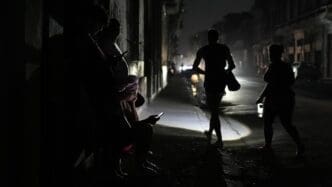A significant power outage plunged Cuba into darkness Friday night, sparking concern for the island’s stability amidst its ongoing economic turmoil.
Millions in Cuba remained without electricity on Saturday after a substantial failure in the nation’s electric grid left the entire island in the dark. This incident marks the fourth such blackout in the past six months, further exacerbating the challenges faced by the Caribbean nation during an intense economic downturn. The Ministry of Energy and Mines attributed the outage to a failure at a critical substation located on the outskirts of Havana.
Lázaro Guerra, the director of electricity at the Ministry of Energy and Mines, addressed the nation on television, assuring that power was being generated to support essential services, including hospitals. A plan to create interconnected ‘microsystems’ is underway, with some already functioning in regions like Guantánamo, Santiago, Las Tunas, and Pinar del Río. Despite these efforts, the internet and telecommunication services remain inconsistent over 12 hours after the blackout commenced at approximately 8 p.m. on Friday.
This situation harkens back to similar outages that occurred in October, November, and December, but this is the first instance in 2025. Last February, the nation faced a severe shortage of electricity generation, prompting the government to halt academic and work activities for two consecutive days, with the deficit reaching over 50% across the country.
Experts suggest that the pervasive electricity disruptions stem from fuel shortages at power plants, many of which have been operational for over three decades, and an aging infrastructure. Coupled with the ongoing economic crisis, attributed to the COVID-19 pandemic, domestic policy-induced inflation, and intensified U.S. sanctions, these factors are pushing Cuba into deeper turmoil.
The impact of the blackout extends to daily life as many Cubans rely on electric appliances for cooking. Given the tropical climate, prolonged outages could lead to spoiled food as it thaws in non-operational refrigerators. Cecilia Duquense, a 79-year-old resident of Central Havana, exemplified these challenges, stating, ‘When I was about to start cooking and making some spaghetti, the power went out. And now what?’
These outages underscore the broader economic and logistical challenges that Cuba faces. As the government and experts alike search for solutions, the resilience of the Cuban people continues to be tested in these unprecedented times.
Cuba’s latest power grid failure highlights the nation’s broader struggles with economic challenges and infrastructure decay. As authorities endeavor to restore electricity and stabilize essential services, the need for long-term solutions becomes ever more pressing. The crisis not only underscores the fragility of Cuba’s current systems but also the resilience of its people in the face of adversity.








